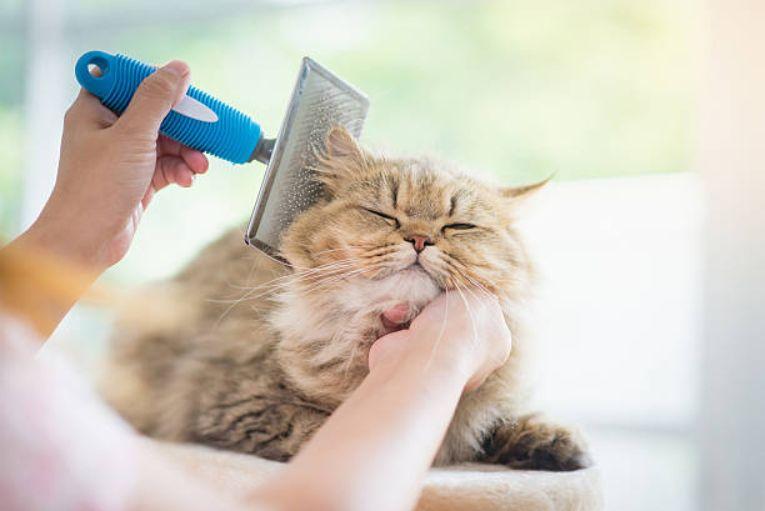
Cats typically take care of daily grooming by themselves. Cats instinctively groom themselves to banish any odors that may be noticed by other animals, especially predators. Cats are also able to maintain a healthy-looking coat by daily grooming and distributing natural oils to keep their coats clean and shiny.
The Benefits and Importance of Feline Grooming
While cats do a good job with basic grooming on their own, there are a number of grooming related items that they need help with. These include:
- A weekly flea or external parasite check
- Noticing mats in your cat’s fur before they become unmanageable
- Attending to any dermatologic problems by scheduling a vet appointment
- Keeping tabs on whether your cat has gained or lost weight
- Checking to make sure your cat’s nails are trimmed
If you notice irregularities or have questions we would encourage you to schedule a veterinary appointment.
Bathing
From a veterinary perspective, cat bathing is rarely recommended and typically cats don’t require baths. Many cats can become stressed by bathing. Typically, the only time you may need to bathe your cat is if he or she gets into something that has to be promptly removed from the fur. If this is the case, here is what we suggest:
- Use a mild shampoo labeled for dogs or cats
- Keep the water temperature warm, not hot or cold
- Perform the bathing in a small area, to minimize the chances for your cat to run off
- Before you get started, know how to handle your cat properly
Of course, if dermatological conditions arise, then bathing with a prescribed cleanser may be recommended.
Nail Trimming
Trimming your cat’s nails can be challenging. One of the best and safest ways to trim your cat’s nails is to be informed before you begin. Perhaps watching a video will teach you how to hold your cat comfortably while showing you step by step how to get the job done quickly, without causing stress to your cat. We would recommend Fear Free standards and techniques for nail trims whenever possible, there are videos available online. Specialized cat nail clippers can be used, however, it is extremely important to understand that most of what looks like the cat’s nail actually contains the cat’s “quick” which delivers blood supply to the nail. As the cat’s nail gets longer, so does the quick. This is why trimming longer nails can result in the nail bleeding. However, as the tip of the nail is trimmed, the quick will recede. Therefore, proper trimming of a cat’s nails involves trimming the very tip of the nail and then waiting a few days for the quick to recede, then trimming the very tip of the nail again. This can be repeated several times on longer nails until the quick recedes enough that you are able to trim the nail to the proper length. However, even once you understand the procedure for trimming your cat’s nails little by little, the trickiest part may be simply handling the cat in a way that you will be able to trim the nail without causing undue trauma to the cat and potentially earning yourself some cat scratches along the way. When in doubt, cat claw trimming is a task that is best left to professionals. Out technicians can perform nail trims and can also coach you in what works best for your cat.
there are videos available online. Specialized cat nail clippers can be used, however, it is extremely important to understand that most of what looks like the cat’s nail actually contains the cat’s “quick” which delivers blood supply to the nail. As the cat’s nail gets longer, so does the quick. This is why trimming longer nails can result in the nail bleeding. However, as the tip of the nail is trimmed, the quick will recede. Therefore, proper trimming of a cat’s nails involves trimming the very tip of the nail and then waiting a few days for the quick to recede, then trimming the very tip of the nail again. This can be repeated several times on longer nails until the quick recedes enough that you are able to trim the nail to the proper length. However, even once you understand the procedure for trimming your cat’s nails little by little, the trickiest part may be simply handling the cat in a way that you will be able to trim the nail without causing undue trauma to the cat and potentially earning yourself some cat scratches along the way. When in doubt, cat claw trimming is a task that is best left to professionals. Out technicians can perform nail trims and can also coach you in what works best for your cat.
Cat Hair Cuts
Most veterinarians typically do not recommend cutting your cat’s fur. For some long-haired breeds whose fur becomes matted or hopelessly tangled, those tangles may need to be cut out. There are a few styles such as the “lion cut” which have become popular among owners of long-haired cats. However, these cuts require trimmers that can make cats very uneasy, startled and unnecessarily traumatized. These are services that are best left in the hands of professionals. Some cats require oral or injectable sedation to be able to perform this procedure, especially if there are painful mats present.
Tips For Bathing, Nail Clipping, Hair Cutting and Combing At Home
- Cats who have long hair need to be combed more often than short-haired cats. Try to comb your cat’s fur at least a couple times per week.
- Keep your cat’s nails trimmed for their comfort and to protect yourself from being scratched. In some cases it’s best to leave nail clipping to a professional.
- If you notice your cat itching, biting or developing skin problems such as bumps, rashes, fur loss, or scaly dry skin make a veterinary appointment.
If your cat is not keeping up with grooming or you notice anything unusual on his or her skin, make a veterinary appointment today. Our staff is available to take your call and would be happy to help.
